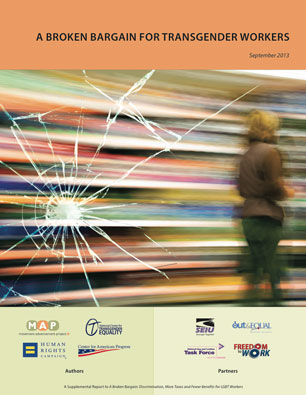The Bottom Line
The basic American bargain is that those who work hard and meet their responsibilities should be able to get ahead. It is an agreement that workers will be judged and rewarded based on their contributions and capabilities— no matter who they are, what they look like, or where they are from. However, no federal law provides explicit legal protections for transgender workers based on gender identity/expression, and only 17 states and the District of Columbia have laws that offer these protections.
A Broken Bargain for Transgender Workers offers the most comprehensive analysis to date of the inequities facing transgender workers in the American workforce—from finding and keeping good jobs, to having equal access to job-related benefits, to obtaining adequate health insurance coverage. The report also offers specific recommendations for policymakers and employers to reduce and eliminate inequities for transgender workers and help restore America’s basic workplace bargain of fairness and equality.
A Broken Bargain for Transgender Workers Download
Recommended citation:
Movement Advancement Project, National Center for Transgender Equality, Human Rights Campaign, and Center for American Progress. September 2013.
A Broken Bargain for Transgender Workers.
https://www.lgbtmap.org/transgender-workers (date of access).


